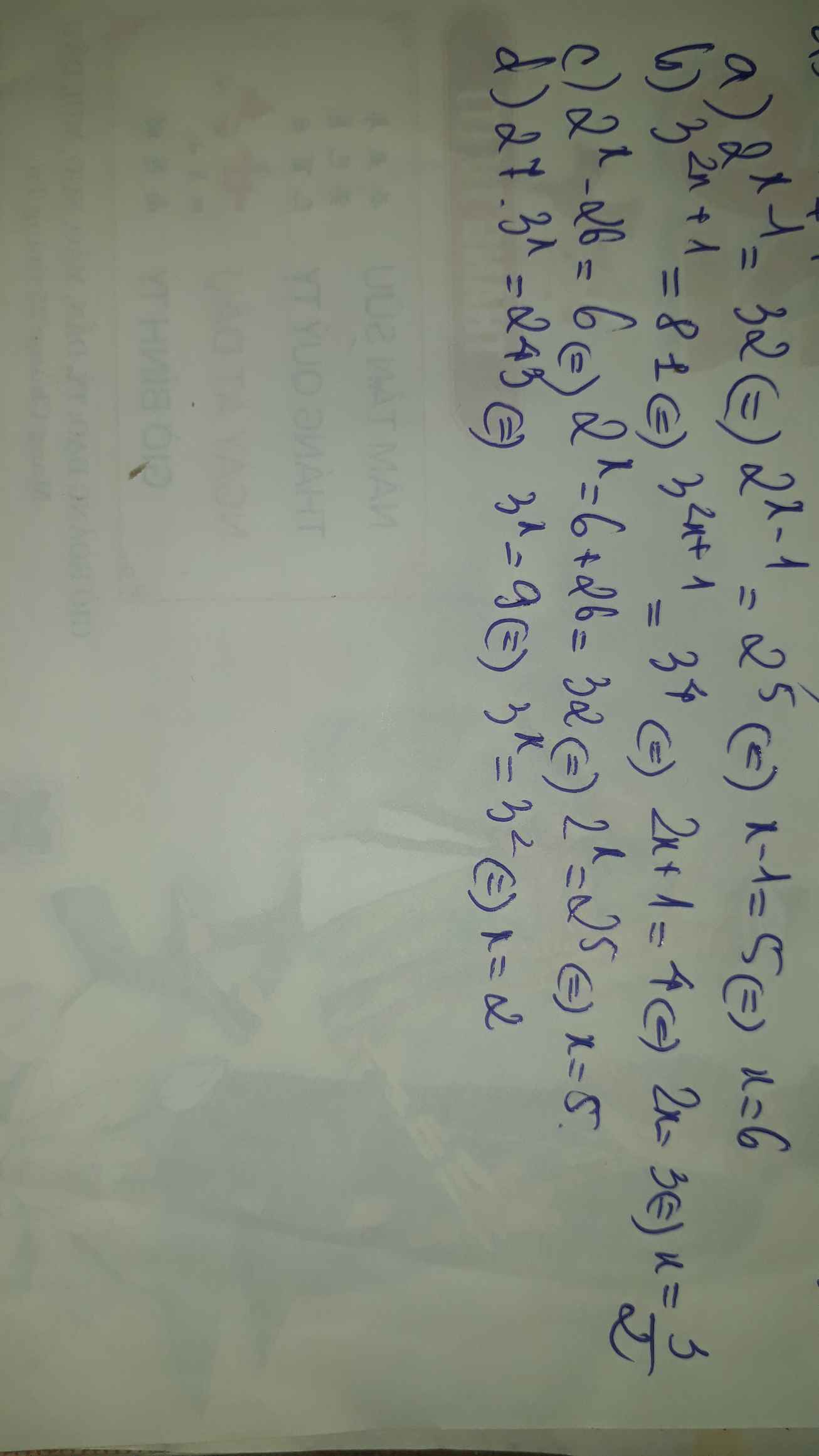
Hãy nhập câu hỏi của bạn vào đây, nếu là tài khoản VIP, bạn sẽ được ưu tiên trả lời.


a) (2x-121)1990=1990
2x-121=1990:1990
2x-121=1
2x=1+121
2x=122
x=122:2
x=61
b)(3x-27).2016=0
3x-27=0:2016
3x-27=0
3x=0+27
x=27:3
x=9
c)x.(3x-9)=0
=> hai trường hợp x=0 hoặc 3x-9=0
3x-9=0
3x=0+9
3x=9
x=9:3
x=3
=> x =0;3
d)
(x-1)(x-5)=0
có 2 trường hợp
x-1=0 và x-5=0
x=1+0=1 x=5+0=5
=>x=1;5
k cho mình nha <3

a) (3x+9) (5x-515) =0
Trường hợp 1: 3x+9=0
--> 3x= 0-9
3x = -9
x = -3
Trường hợp 2: 5x - 515 = 0
--> 5x = 0+ 515
5x = 515
x= 515 : 5
x = 103
a) Vì tích chúng bằng 0 nên phải có ít nhất 1 thừa số bằng 0.
Mà x thuộc n nên 3x + 9 không thể bằng 0. Vậy 5x - 515 = 0. Để 5x - 515 = 0 thì 5x = 515. Suy ra x = 103. Vậy x = 103
b) 100 : [(3x - 5) - 27] = 10
=> (3x - 5) - 27 = 10
=> 3x - 5 = 37
=> 3x = 42
=> x = 14

a, 2x-100=0 c, (x+11)(3x-9)=0
2x=100 Vậy x+11=0 hoặc 3x-9=0
x=50 x+11=0 suy ra x=-11 mà x thuộc N (loại)
b, 5(7x)=0 3x-9=0 suy ra x=3 (thỏa mãn)
35x=0
x=0

a) \(\left(3x+9\right)\left(x^2-16\right)=0\)
\(\Leftrightarrow\)\(3\left(x+3\right)\left(x^2-16\right)=0\)
\(\Leftrightarrow\)\(\orbr{\begin{cases}x+3=0\\x^2-16=0\end{cases}}\)
\(\Leftrightarrow\)\(\orbr{\begin{cases}x=-3\\x=\pm4\end{cases}}\)
Vậy...
b) \(\left(x-3\right)\left(x^3+27\right)=0\)
\(\Leftrightarrow\)\(\orbr{\begin{cases}x-3=0\\x^3+27=0\end{cases}}\)
\(\Leftrightarrow\)\(\orbr{\begin{cases}x=3\\x=-3\end{cases}}\)
Vậy...


`a) 27.3^x =243`
`3^x=243/27=9`
`3^x=3^2`
`=>x=2`
`b) 49.7^x =2401`
`7^x = 2401/49=49`
`7^x=7^2`
`=>x=2`
`c) 3^x +25 =26*2^2+2.3^0`
`3^x = 26.4+2.1-25 = 81`
`3^x =3^4`
`=>x=4`
\(e,27.3^x=243\\ \Leftrightarrow3^3.3^x=3^5\\ \Leftrightarrow3^{3+x}=3^5\\ \Rightarrow3+x=5\\ \Leftrightarrow x=2\\ g,49.7^x=2401\\ \Leftrightarrow7^2.7^x=7^4\\ \Leftrightarrow7^{2+x}=7^4\\ \Rightarrow2+x=4\\ \Leftrightarrow x=2\\ h,3^x+25=26.2^2+2.3^0\\ \Leftrightarrow3^x+25=26.4+2.1\\ \Leftrightarrow3^x=104+2-25\\ \Leftrightarrow3^x=81=3^4\\ Vậy:x=4\)

a: Ta có: \(2^{x-1}=32\)
\(\Leftrightarrow x-1=5\)
hay x=6
b: Ta có: \(3^{2x+1}=81\)
\(\Leftrightarrow2x+1=4\)
\(\Leftrightarrow2x=3\)
hay \(x=\dfrac{3}{2}\)
c: Ta có: \(2^x-26=6\)
\(\Leftrightarrow2^x=32\)
hay x=5
d: Ta có: \(27\cdot3^x=243\)
\(\Leftrightarrow3^x=9\)
hay x=2

a) \(\left(2x+\frac{3}{5}\right)^2-\frac{9}{25}=0\)
\(\left(2x+\frac{3}{5}\right)^2=\frac{9}{25}\)
\(\left(2x+\frac{3}{5}\right)^2=\left(\frac{3}{5}\right)^2\)
\(=>2x+\frac{3}{5}=\frac{3}{5}\)
\(2x=\frac{3}{5}-\frac{3}{5}\)
\(2x=0\)
\(x=0:2\)
\(x=0\)
b) \(\left(3x-1\right).\left(-\frac{1}{2x}+5\right)=0\)
=> \(\left(3x-1\right)=0\)hoặc \(\left(-\frac{1}{2x}+5\right)=0\)hoặc \(\left(3x-1\right)\)và\(\left(-\frac{1}{2x}+5\right)\)cùng bằng 0.
\(\orbr{\begin{cases}3x-1=0\\-\frac{1}{2x}+5=0\end{cases}}=>\orbr{\begin{cases}3x=1\\-\frac{1}{2x}=-5\end{cases}}=>\orbr{\begin{cases}x\in\varnothing\\2x=\frac{1}{5}\end{cases}}=>x=\frac{1}{5}:2=>x=\frac{1}{10}\)

